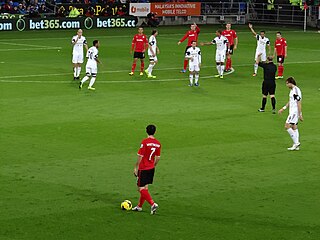Final
Cardiff City | Wrexham |
The 1987-88 Welsh Cup winners were Cardiff City. The final was played at the Vetch Field in Swansea in front of an attendance of 5,465.
| Tie no | Home team | Score | Away team |
|---|---|---|---|
| 1 | Cardiff City | 2–1 | Caernarfon Town |
| 2 | Kidderminster Harriers | 1–2 | Wrexham |
| Tie no | Home team | Score | Away team |
|---|---|---|---|
| 1 | Caernarfon Town | 0–1 | Cardiff City |
| 2 | Wrexham | 3–2 | Kidderminster Harriers |
Cardiff City | Wrexham |

Swansea City Association Football Club is a professional football club based in Swansea, Wales that plays in the Championship, the second tier of English football. Swansea have played their home matches at the Swansea.com Stadium since 2005, having previously played at the Vetch Field since the club was founded.
The 1982–83 season of the European Cup Winners' Cup was won by Aberdeen FC in an extra-time victory against Real Madrid. Alex Ferguson's young side defeated the Spanish giants after a notable victory over FC Bayern Munich in the quarter-final. Having conquered the domestic game in Scotland, by defeating the European Cup holders Hamburger SV to win the 1983 European Super Cup, Aberdeen went on to become the only Scottish team to win two European trophies, a record which still stands today. It was the second and last time the title went to Scotland, following Rangers' victory in 1972.

The Vetch Field was a football stadium in Swansea, Wales. It was used for football matches and was the home ground of Swansea City until the club moved to the newly built Liberty Stadium in 2005. Opened in 1912, the ground held around 12,000 at the time of its closure, but upwards of 30,000 at its peak.
The 1969–70 British Home Championship Home Nations international football tournament was a heavily contested series which contradicted the common view that it would be little more than a warm-up for the English team prior to the 1970 FIFA World Cup, at which they were to defend the title they had won on home soil four years earlier. They had won the two previous tournaments and were considered much stronger than the other three home nations, none of whom had qualified for the finals in Mexico. The English however struggled in their opening fixture, drawing with the Welsh away, and although they subsequently beat the Irish, were unable to overcome the Scots. Scotland had a good opening to the campaign, but drew their last two games, whilst Wales salvaged parity following a victory over Northern Ireland in their final fixture. Since goal difference was not at this time used to determine position, England, Wales and Scotland shared the trophy. Had modern scoring techniques been in place, England would have won, followed by the Welsh and the Scots.
The 1963–64 British Home Championship international Home Nations football tournament was an unusual affair in which victory was shared between the England, Scotland and Ireland national football teams after all teams scored four points by beating Wales and then winning one and losing one of their remaining matches. Goal difference was not at this stage used to determine team positions in the tournament, but if it had been, England would have won with a goal difference of +8 with Scotland second and Ireland third.
The 1951–52 British Home Championship was an international football tournament played between the British Home Nations during the 1951–52 season. In an unusual conclusion, Wales shared the championship with England, one of only four tournaments Wales would share victory in post-war. Ireland by contrast endured one of their worst championships of the period, losing all three games and failing to score. Scotland too underperformed, although their two losses were both hard-fought.
The 1928–29 British Home Championship was a football tournament played between the British Home Nations during the 1928–29 season. The competition was won by Scotland, who won all three matches with strong attacking football epitomised by Hughie Gallacher, who scored seven of his team's 12 goals in hat tricks over Wales and Ireland.
The 1924–25 British Home Championship was a football tournament played between the British Home Nations during the 1924–25 season. It was one of six tournaments in seven years won by the strong Scottish team of the early 1920s, and was achieved with a whitewash of all three rivals, including England in the deciding game in Glasgow.
The 1920–21 British Home Championship was a football tournament played between the British Home Nations during the 1920–21 season. The second tournament played since the hiatus of the First World War, the 1921 competition was dominated by Scotland, who won the first of seven championships they would claim throughout the decade. England and reigning champions Wales came joint second as goal difference was not at this stage used to separate teams.

The South Wales derby is a local derby between Welsh association football clubs Cardiff City and Swansea City. The fixture has been described by The Independent as one of the fiercest rivalries in British football. Although based in Wales, both clubs play in the English football league system and have won English honours: Cardiff the FA Cup in 1927 and Swansea the Football League Cup in 2013.

View from a Backstage Pass is a live compilation by The Who. This double album was released on 5 November 2007, available only to new subscribers of The Who.com.

Greatest Hits Live is a compilation of live songs recorded by the Who throughout their history. The album was released exclusively on the iTunes Store on 19 January 2010. This collection was released as a compact disc on 23 March 2010.
The 1988-89 Welsh Cup winners were Swansea City. The final was played at the Vetch Field in Swansea in front of an attendance of 5,100.
The Football League play-offs for the 1987–88 season were held in May 1988, with the two-legged finals taking place at the finalists home stadiums. The play-off semi-finals were also played over two legs and were contested by the teams who finished in 3rd, 4th and 5th place in the Football League Second Division and Football League Third Division and the 4th, 5th, 6th placed teams in the Football League Fourth Division table, along with a team from the league above. The winners of the semi-finals progressed through to the finals, with the winner of these matches either gaining promotion or avoiding relegation for the following season.
The Football League play-offs for the 1998–99 season were held in May 1999, with the finals taking place at the old Wembley Stadium in London. The play-off semi-finals were played over two legs and contested by the teams who finished in 3rd, 4th, 5th and 6th place in the Football League First Division and Football League Second Division and the 4th, 5th, 6th and 7th placed teams in the Football League Third Division table. The winners of the semi-finals went through to the finals, with the winner of the matches gaining promotion for the following season.
The Football League play-offs for the 1996–97 season were held in May 1997, with the finals taking place at the old Wembley Stadium in London. The play-off semi-finals will be played over two legs and will be contested by the teams who finish in 3rd, 4th, 5th and 6th place in the Football League First Division and Football League Second Division and the 4th, 5th, 6th and 7th placed teams in the Football League Third Division table. The winners of the semi-finals will go through to the finals, with the winner of the matches gaining promotion for the following season.
The Football League play-offs for the 1992–93 season were held in May 1993, with the finals taking place at Wembley Stadium in London. The play-off semi-finals were played over two legs and were contested by the teams who finished in 3rd, 4th, 5th and 6th place in the Football League First Division and Football League Second Division and the 4th, 5th, 6th, and 7th placed teams in the Football League Third Division table. The winners of the semi-finals progressed through to the finals, with the winner of these matches gaining promotion for the following season.
Group 1 of the UEFA Euro 1972 qualifying tournament was one of the eight groups to decide which teams would qualify for the UEFA Euro 1972 finals tournament. Group 1 consisted of four teams: Romania, Czechoslovakia, Wales, and Finland, where they played against each other home-and-away in a round-robin format. The group winners were Romania, who finished above Czechoslovakia on goal difference.
The 1988 Football League Fourth Division play-off Final was an association football match contested by Swansea City and Torquay United over two legs on 25 and 28 May 1988, to determine which club would play the following season in the Third Division. Torquay United had finished in fifth place in the Fourth Division while Swansea City finished sixth. They were joined in the play-offs by fourth-placed Scunthorpe United and Rotherham United, who had finished in 21st place in the division above. Swansea City defeated Rotherham United County in their semi-final, consigning the latter to relegation to the Fourth Division, while Torquay United beat Scunthorpe United in the other.